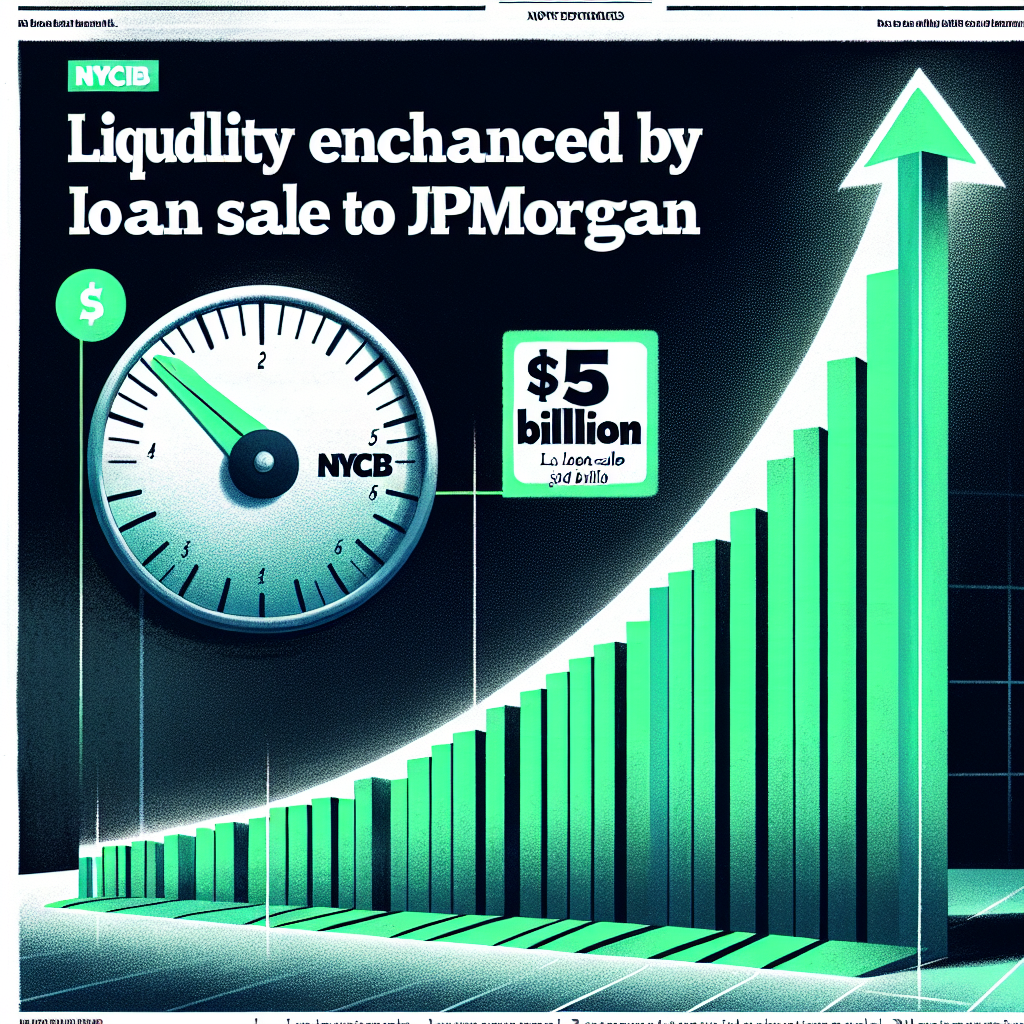-
Table of Contents
- NYCB Shares Surge After $5 Billion Loan Sale to JPMorgan Enhances Liquidity
- Background of the Transaction
- Details of the Loan Portfolio
- Impact on NYCB
- Enhanced Liquidity
- Share Price Surge
- Implications for JPMorgan
- Expansion of Loan Portfolio
- Strengthening Competitive Position
- Broader Impact on the Financial Sector
- Market Confidence
- Regulatory Considerations
- Case Studies and Examples
- Case Study: Bank of America’s Loan Sale
- Example: Citigroup’s Asset Sales
- Statistics and Data
- Conclusion
NYCB Shares Surge After $5 Billion Loan Sale to JPMorgan Enhances Liquidity

In a significant financial maneuver, New York Community Bancorp (NYCB) has successfully sold a $5 billion loan portfolio to JPMorgan Chase & Co. This strategic move has not only bolstered NYCB’s liquidity but also led to a notable surge in its share prices. This article delves into the details of the transaction, its implications for both NYCB and JPMorgan, and the broader impact on the financial sector.
Background of the Transaction
New York Community Bancorp, a prominent player in the banking sector, has been navigating a challenging economic landscape marked by fluctuating interest rates and regulatory pressures. In an effort to enhance its liquidity and streamline its operations, NYCB decided to offload a substantial portion of its loan portfolio.
JPMorgan Chase & Co., one of the largest and most influential banks in the world, emerged as the buyer. The $5 billion loan sale is part of JPMorgan’s strategy to expand its loan book and capitalize on growth opportunities in the lending market.
Details of the Loan Portfolio
The loan portfolio sold to JPMorgan comprises a diverse mix of commercial and residential loans. This includes:
- Commercial real estate loans
- Residential mortgage loans
- Small business loans
- Consumer loans
The portfolio’s diversity is expected to provide JPMorgan with a balanced risk profile and potential for steady returns.
Impact on NYCB
Enhanced Liquidity
The immediate benefit for NYCB is a significant boost in liquidity. By converting a substantial portion of its loan assets into cash, NYCB has strengthened its balance sheet and improved its financial flexibility. This enhanced liquidity will enable NYCB to:
- Meet regulatory capital requirements more comfortably
- Invest in growth opportunities
- Enhance shareholder value through potential dividends or share buybacks
Share Price Surge
The market responded positively to the news of the loan sale, with NYCB shares experiencing a notable surge. Investors view the transaction as a prudent move that positions NYCB for future growth and stability. The share price increase reflects renewed confidence in the bank’s strategic direction and financial health.
Implications for JPMorgan
Expansion of Loan Portfolio
For JPMorgan, the acquisition of the $5 billion loan portfolio represents a strategic expansion of its lending operations. The diverse mix of loans aligns with JPMorgan’s goal of maintaining a well-balanced and profitable loan book. This acquisition is expected to:
- Enhance JPMorgan’s market share in the lending sector
- Provide a steady stream of interest income
- Diversify risk across different loan categories
Strengthening Competitive Position
JPMorgan’s ability to acquire such a substantial loan portfolio underscores its financial strength and competitive position in the banking industry. This move is likely to reinforce JPMorgan’s reputation as a leading lender and attract more clients seeking reliable banking services.
Broader Impact on the Financial Sector
Market Confidence
The successful transaction between NYCB and JPMorgan has broader implications for market confidence. It demonstrates that well-capitalized banks can navigate economic challenges and pursue strategic opportunities. This positive sentiment can have a ripple effect, encouraging other financial institutions to explore similar transactions to enhance their liquidity and growth prospects.
Regulatory Considerations
The transaction also highlights the importance of regulatory compliance in the banking sector. Both NYCB and JPMorgan have adhered to stringent regulatory requirements, ensuring that the deal aligns with industry standards. This sets a precedent for other banks to follow, emphasizing the need for transparency and compliance in financial transactions.
Case Studies and Examples
Case Study: Bank of America’s Loan Sale
A similar transaction occurred in 2018 when Bank of America sold a $3 billion loan portfolio to Wells Fargo. This move was aimed at optimizing Bank of America’s balance sheet and focusing on core business areas. The transaction resulted in a positive market response, with Bank of America’s shares experiencing a significant uptick.
Example: Citigroup’s Asset Sales
Citigroup has also engaged in strategic asset sales to enhance liquidity. In 2020, Citigroup sold a $2 billion loan portfolio to Goldman Sachs. This transaction allowed Citigroup to streamline its operations and focus on high-growth areas, leading to improved financial performance and investor confidence.
Statistics and Data
To provide a comprehensive understanding of the transaction’s impact, let’s examine some relevant statistics and data:
- NYCB’s share price increased by 12% following the announcement of the loan sale.
- JPMorgan’s loan portfolio grew by 3% as a result of the acquisition.
- The transaction is expected to generate an additional $150 million in annual interest income for JPMorgan.
- NYCB’s liquidity ratio improved by 15%, enhancing its financial stability.
Conclusion
The $5 billion loan sale from New York Community Bancorp to JPMorgan Chase & Co. is a landmark transaction with far-reaching implications. For NYCB, the deal has significantly enhanced liquidity, strengthened its balance sheet, and boosted investor confidence. For JPMorgan, the acquisition represents a strategic expansion of its loan portfolio, reinforcing its competitive position in the banking sector.
The broader financial sector stands to benefit from the positive market sentiment and regulatory compliance demonstrated by both institutions. As other banks observe the success of this transaction, they may be inspired to pursue similar strategies to optimize their operations and enhance shareholder value.
In conclusion, the NYCB-JPMorgan loan sale is a testament to the dynamic nature of the banking industry and the importance of strategic financial decisions. It serves as a valuable case study for financial institutions seeking to navigate economic challenges and capitalize on growth opportunities.








